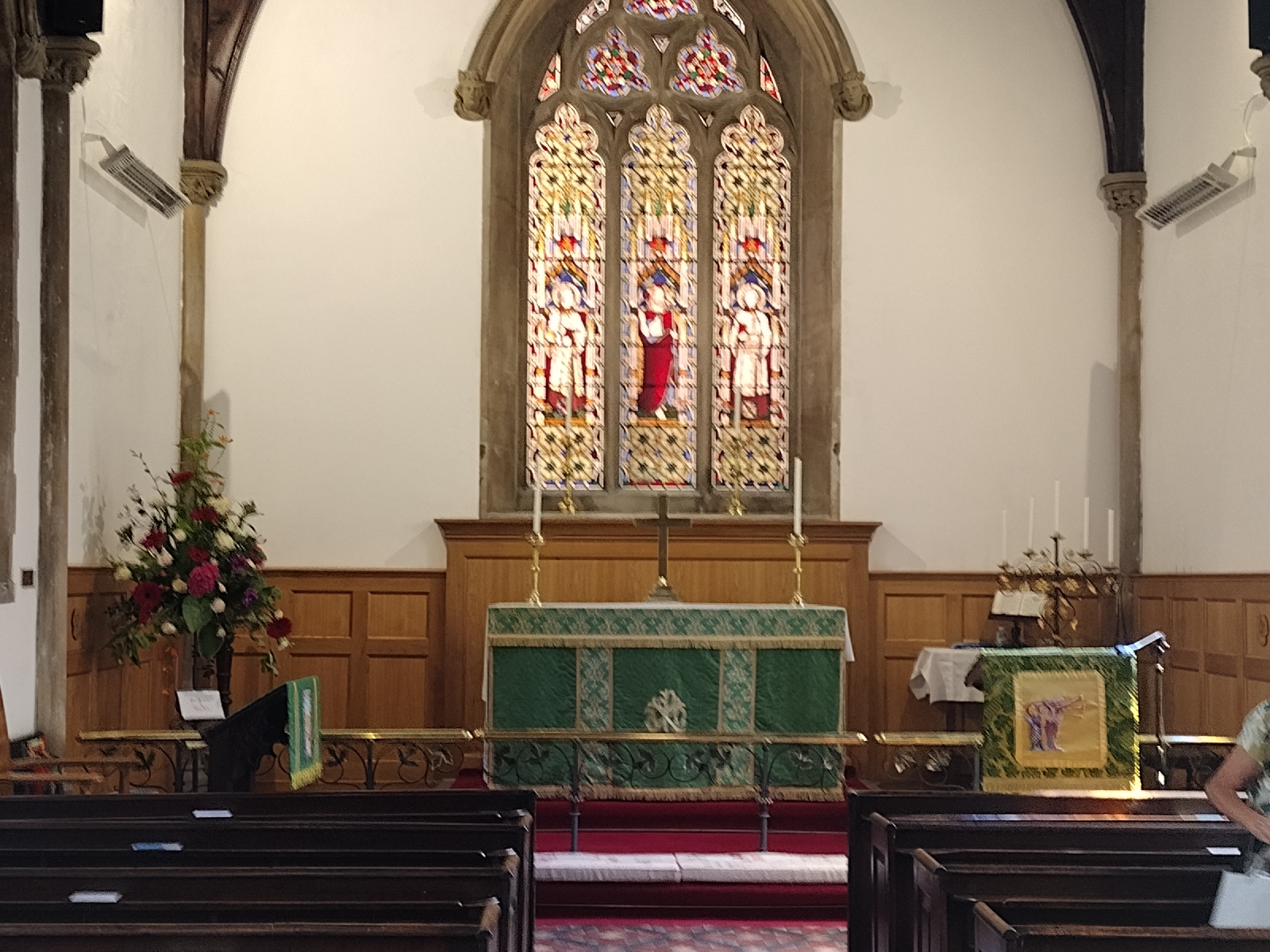Photo of Oradour-sur-Glane
Today is Remembrance Sunday.
It’s not an easy day to preach
on, although I have done so many times over the years.
But what
do you say that doesn’t appear either a facile glorification of
war, or a total dismissal of those who lost their lives, or were
injured, or, worst of all, lost their faith during them?
Here
in Britain we’ve been relatively lucky.
There hasn’t been a
battle fought on British soil since Culloden in 1745.
We
suffered the Blitz, of course, when many of our cities were badly
damaged, or even destroyed –
you can see the scars to this
day, even around Brixton.
So many streets of Edwardian terraces
have a sudden more modern block in the middle.
But we haven’t
had jackbooted soldiers marching about the place, or tanks running
through our back gardens.
You know, the more I think of
it, the more awful I feel, because I know that many of you had to
endure, or your parents had to endure, exactly that!
British
troops strutting about the place, issuing orders, interfering with
your daily lives, generally behaving as if they owned the world!
It
isn’t just the British, of course!
In fact, in 1944, British
soldiers were warmly welcomed into Normandy by the local people, who
had suffered for four long years of Nazi occupation.
But that,
of course, was not the end of it –
much of the local area was
destroyed by the troops fighting for dominance.
Today we
are supposed to remember those who fought and died, those who fought
and were wounded.
And indeed we must and should –
whatever
side they fought on;
whether they enlisted voluntarily or were
conscripted;
whether they thought their cause was right and
just, or whether they went unwillingly in service to a regime they
hated. Many of us will know of family members who were killed or
wounded in one of the two great wars of the 20
th century,
or one of the many lesser conflicts.
Perhaps you have family
members involved in the current wars in Ukraine or Gaza or Sudan, or
again, in many of the lesser conflicts around the world.
Today
is the day we honour them and remember them.
But we also
need to remember the civilians;
those whose houses or
livelihoods were destroyed by enemy action;
those whose homes
were requisitioned by the armed forces, whether their own, or the
enemy;
those who lost loved ones;
those whose lives were
totally disrupted by having to serve as nurses, or in factories, or
down the mines.
This summer, we visited the village of
Oradour-sur-Glane in France, which has been left as a memorial to the
641 people who were killed by SS troops there in June 1944.
You
go into the village through the visitor centre, and past a wall with
photographs of all those who were killed.
From old men down to
small children.
Many of the photos were formal pictures, wedding
shots, first Communion pictures, that sort of thing.
It really
didn’t bear thinking about, and yet it was only one of many
atrocities committed in that war.
Allies as well as Axis powers,
I may say –
both sides did awful things, as happens in any
war.
And even if you escaped being bombed, or shot, or
anything, there were still awful things.
I’ve read my
great-grandfather’s diaries.
His elder son was wounded so
badly in 1916 that nobody thought he would live –
although he
did, or I wouldn’t be here to tell the tale.
He only lived
because the surgeon said he would remove his leg if he thought it
would save his life, but it probably wouldn’t.
So he was left
in the pile of soldiers who were going to die which, it is thought,
is what saved him, as the cold protected him from shock.
Anyway,
my great-grandfather got permission from the War Office and
went over to France to visit him.
And then it became clear that
he would live, after all, so my great-grandfather came home again,
only to hear that his other son had been killed on the Somme.
And,
twenty years later or so, my grandparents had to suffer the agony of
knowing their only son –
my father –
was on active
service, as was a daughter’s fiancé.
Not only that, but their
home had been requisitioned by the War Office and they had ten days
to get out – and the troops that occupied it damaged it and
destroyed many old family records.
I’m not saying this
to elicit pity.
It happened, and we were very far from the only
family it happened to.
Many had things far, far worse.
So
where, then, is God in all this?
To quote St Paul:
“I am
convinced that neither death, nor life, nor angels, nor rulers, nor
things present, nor things to come, nor powers, nor height, nor
depth, nor anything else in all creation, will be able to separate us
from the love of God in Christ Jesus our Lord.”
But it’s
difficult, isn’t it?
Many people, I know, lost their faith
during and after the World Wars, feeling that if God could allow such
horrors –
well….
But then, we were never told
life would be a bed of roses.
In fact, rather the reverse.
In
fact, Jesus explicitly said it wouldn’t be easy.
He said,
“Blessed are the Peacemakers”
But he also said that there
would always be wars, and rumours of wars.
We are told to make
peace, even while we know we will be unsuccessful.
Many
years ago now, Robert and I visited New York less than a fortnight
after the World Trade Centre was destroyed.
We had planned our
holiday months earlier, and decided not to allow terrorism and war to
disrupt our lives more than was strictly necessary.
Besides,
what safer time to go, just when security was at its height?
Anyway,
the first Sunday we were there, we felt an urgent need to go to
Church, to worship with God’s people.
Not knowing anything
about churches in Brooklyn, we went to the one round the corner from
where we were staying, which turned out to be a Lutheran Church.
And
I’m so glad we went –
the people there were so pleased to
know that people were still visiting from England.
They knew
they faced a hard time coming to terms with what had happened, and
that the future was very uncertain for all of us, yet they knew, too,
that God was in it with them.
And God is in it with us,
too.
Whatever happens.
God was there in the trenches with
those young men in the first War;
God was there in the bombing
and occupations of the Second War.
God was there in the Twin
Towers that day, and in the hijacked planes, too.
God is there
in Ukraine, and in Russia;
in Gaza and in Israel.
We,
who call ourselves Christians, sometimes refuse to fight for our
country,
believing that warfare and Christianity aren’t really
compatible.
I am inclined to agree, but for one thing –
do
we really want our armed forces to be places where God is not
honoured?
That’s the big problem with Christian pacifism –
it
leaves the armed forces very vulnerable.
But we must do
all that we can to make peace.
I don’t know what the rights
and wrongs of most current conflicts, but I do know that people are
suffering.
They are suffering in Ukraine.
They are
suffering in Gaza, and that conflict may yet escalate –
British
troops have been sent to Cyprus to help if British subjects need to
be evacuated from Lebanon.
At that British troops are training,
with others, all across Europe in case the Ukraine conflicts
escalate.
War causes suffering.
It is never noble, or
glorious, and I’m not quite sure whether it is ever right.
Even
if it is, it is horrible.
And inevitable.
And we Christians
must do all we can to bring peace,
and we must wear our poppies
and remember, each year, those who had to suffer and die, and
those who continue to suffer and die.
And above all, we
must pray for our armed forces –
for any value of “our”,
by the way;
I certainly don’t mean just British ones!
We
need to pray, and to remember, with St Paul, that nothing, absolutely
nothing, can separate us from the love of Christ.
Amen.







